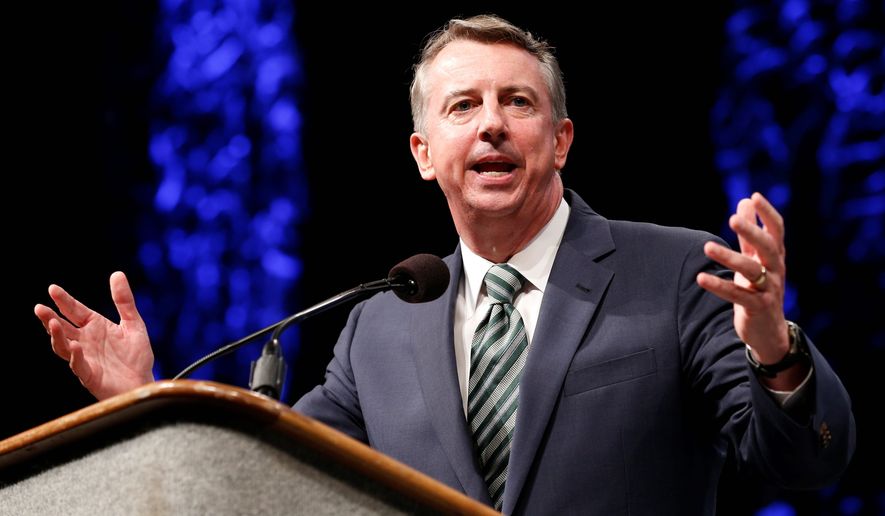Republicans have closed gaps in Senate races across the country, but Virginia — a swing state where the GOP should be more competitive — has proved to be the exception, with longtime party operative Ed Gillespie failing to make headway against freshman Sen. Mark R. Warner.
Republican operatives insist they have the right candidate and that the margin will close in the coming months in an environment favorable for the GOP, but outside groups have shown scant interest in backing Mr. Gillespie, who is being outspent, is still largely unknown by voters and has yet to really dent the popular Mr. Warner.
“I’m the tortoise. Three yards and a cloud of dust,” Mr. Gillespie said, chuckling. “I know where this race is in my gut. I know how vulnerable Senator Warner has become. And his record — I know that my policies resonate with the voters, and I just feel like the next 10 weeks or so are going to be very, very good.”
Election analysts agree there should be an opportunity for a Republican to make the race competitive.
Quentin Kidd, a political science professor at Christopher Newport University, said polling early this year indicated a slight disconnect between Mr. Warner’s 63 percent approval rating and the percentage of voters who said he actually deserved re-election.
“But when you put Warner and Gillespie head-to-head, [Warner] had a 20-point lead,” Mr. Kidd said. “I think his liability right now is that Warner is really liked and Gillespie is unknown.”
Mr. Gillespie, a former Republican National Committee chairman and senior adviser to President George W. Bush, is doing what he can to raise his visibility to the broader electorate. He has been crisscrossing the state in what his campaign dubbed the “Ease the Squeeze” tour and held a rally last week with Sen. John McCain of Arizona in Norfolk in hopes of boosting his standing with the state’s sizable military population.
Elsewhere in the country, Republicans are turning sleeper races into hot contests — notably in Iowa, Michigan and New Hampshire. Even incumbent senators in deep-blue states are feeling heat. Recent polling has found leads have shrunk to single digits for Sen. Al Franken, Minnesota Democrat, and Sen. Richard J. Durbin, Illinois Democrat.
In Virginia, though, the latest polling averages show Mr. Warner still maintains close to a 20-point lead over Mr. Gillespie. Libertarian candidate Robert Sarvis is also running.
With so many other options on the table, conservative groups have been unwilling to spend on Mr. Gillespie’s behalf, leaving him to fight on his own.
At the end of July, Mr. Gillespie had $3 million cash on hand compared to Mr. Warner’s $9 million.
Outside spending is around $1.2 million, the bulk of which is actually anti-Gillespie buys from a super PAC supporting Mr. Warner. By comparison, groups have spent about $18 million already just to the south in North Carolina, where incumbent Sen. Kay R. Hagan is fending off a strong challenge from Republican Thom Tillis.
Mr. Warner, meanwhile, has tried to play up his efforts reaching across the aisle during more than five years in the Senate, with his campaign going as far as saying bipartisanship is part of his DNA.
“Whether bringing jobs back from overseas, helping borrowers pay down student debt or reducing our nation’s debt and deficit, Senator Warner has been able to find common ground and real solutions,” said spokesman David Turner.
Party operatives, though, hope the race tightens as the fall stretch run kicks into gear and Mr. Gillespie tries to tie Mr. Warner’s Senate record to an increasingly unpopular President Obama.
“There is no way the way President Obama’s numbers are it’s a 20-point race, but the Warner campaign is doing a good job making sure nobody is paying attention to this race,” GOP strategist Ford O’Connell said.
For his part, Mr. Warner has built up reservoirs of goodwill across the commonwealth dating back to his 2001 gubernatorial run and even his first bid for Senate in 1996.
But he’s also a freshman senator in a much more polarized atmosphere than existed during his time as governor, when he managed to cajole moderate Republicans in the state legislature into supporting much of his agenda.
In their first debate, Mr. Gillespie quipped that Governor Warner wouldn’t recognize Senator Warner today.
“When you stand for re-election, voters are going to weigh whether or not the record you’ve racked up warrants re-election,” said Mr. Gillespie, who, for example, has highlighted Mr. Warner’s vote for Obamacare. “It’s the last thing he wants to talk about.”
But Dave “Mudcat” Saunders, a strategist who helped Mr. Warner make inroads into rural parts of the state during his 2001 gubernatorial run, said the Democrat has done a decent job of insulating himself from the president. Most recently, he’s been touring college campuses talking about the relatable issue of student loan debt and has called on Mr. Obama’s administration to present a clear plan to Congress to deal with the threat of the Islamic State terrorist group.
“He was painted with a positive brush, and it dried well before anybody had heard of Obama,” Mr. Saunders said. “B.O. — he’s ’before Obama.’ “
• David Sherfinski can be reached at dsherfinski@washingtontimes.com.




Please read our comment policy before commenting.